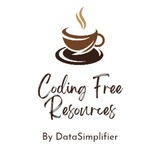❤3👍2
Essential Math for AI.pdf
18.1 MB
Essential Math for AI
Hala Nelson, 2022
Hala Nelson, 2022
Natural Language Processing with Transformers.pdf
6.4 MB
Natural Language Processing with Transformers
Lewis Tunstall, 2022
Lewis Tunstall, 2022
Cracking Codes with Python.pdf
7.6 MB
Cracking Codes with Python
Al Sweigart, 2018
Al Sweigart, 2018
hands-on-data-science.pdf
15.3 MB
Hands-On Data Science and Python Machine Learning
Frank Kane, 2017
Frank Kane, 2017
❤2
Data Analyst Interview Questions.pdf
81.4 KB
Data Analyst Interview Questions
50-useful-python-scripts-free-pdf (3).pdf
426.5 KB
50 Useful Python Script Free
👍4
c interview questions handwritten notes (1).pdf
4.8 MB
C Interview Questions 🙌
React "❤️" For More
React "❤️" For More
❤7
To start with Machine Learning:
1. Learn Python
2. Practice using Google Colab
Take these free courses:
https://t.iss.one/datasciencefun/290
If you need a bit more time before diving deeper, finish the Kaggle tutorials.
At this point, you are ready to finish your first project: The Titanic Challenge on Kaggle.
If Math is not your strong suit, don't worry. I don't recommend you spend too much time learning Math before writing code. Instead, learn the concepts on-demand: Find what you need when needed.
From here, take the Machine Learning specialization in Coursera. It's more advanced, and it will stretch you out a bit.
The top universities worldwide have published their Machine Learning and Deep Learning classes online. Here are some of them:
https://t.iss.one/datasciencefree/259
Many different books will help you. The attached image will give you an idea of my favorite ones.
Finally, keep these three ideas in mind:
1. Start by working on solved problems so you can find help whenever you get stuck.
2. ChatGPT will help you make progress. Use it to summarize complex concepts and generate questions you can answer to practice.
3. Find a community on LinkedIn or 𝕏 and share your work. Ask questions, and help others.
During this time, you'll deal with a lot. Sometimes, you will feel it's impossible to keep up with everything happening, and you'll be right.
Here is the good news:
Most people understand a tiny fraction of the world of Machine Learning. You don't need more to build a fantastic career in space.
Focus on finding your path, and Write. More. Code.
That's how you win.✌️✌️
1. Learn Python
2. Practice using Google Colab
Take these free courses:
https://t.iss.one/datasciencefun/290
If you need a bit more time before diving deeper, finish the Kaggle tutorials.
At this point, you are ready to finish your first project: The Titanic Challenge on Kaggle.
If Math is not your strong suit, don't worry. I don't recommend you spend too much time learning Math before writing code. Instead, learn the concepts on-demand: Find what you need when needed.
From here, take the Machine Learning specialization in Coursera. It's more advanced, and it will stretch you out a bit.
The top universities worldwide have published their Machine Learning and Deep Learning classes online. Here are some of them:
https://t.iss.one/datasciencefree/259
Many different books will help you. The attached image will give you an idea of my favorite ones.
Finally, keep these three ideas in mind:
1. Start by working on solved problems so you can find help whenever you get stuck.
2. ChatGPT will help you make progress. Use it to summarize complex concepts and generate questions you can answer to practice.
3. Find a community on LinkedIn or 𝕏 and share your work. Ask questions, and help others.
During this time, you'll deal with a lot. Sometimes, you will feel it's impossible to keep up with everything happening, and you'll be right.
Here is the good news:
Most people understand a tiny fraction of the world of Machine Learning. You don't need more to build a fantastic career in space.
Focus on finding your path, and Write. More. Code.
That's how you win.✌️✌️
👍4
👍5
